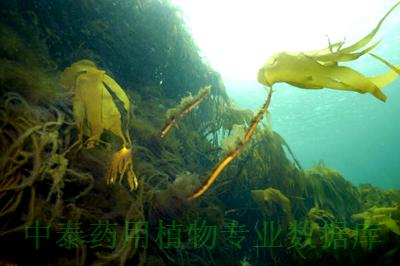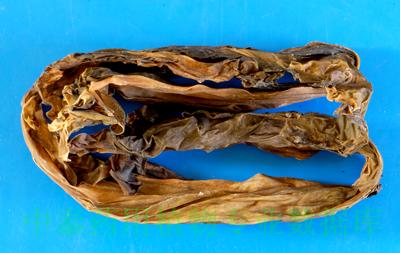| [English Name] | Kelp | |
| [Chinese Name] | 昆布 | |
| [Pinying Name] | Kunbu | |
| [Latin Name] | Laminariae Japonicae Thallus | |
| [Genera] | haidaike | |
| [Efficacy] | huatanyao | |
| [Pictures] | Plant picture | Drug picture |

|

|
|
| [Alias] | ||
| [Source] | ||
| [Plant morphology] | ||
| [Distribution] | ||
| [Gathering and processing] | ||
| [Characteristics] | ||
| [Ecology] | Kelp originally is cold-water tolerance alga.It’s growth temperature is between 0 to |
|
| [Chemical composition] | ||
| [Pharmacological activities] |
1. Effect on Cardiovascular System: oleic acid, myristic acid, palmitic acid and dihydrogen iodate histamine show periaqueductal gray stimulation on isolate heart[1]. Laminine show decreased the blood pressure effect[2-6]. 2.Reducing Blood Lipid: Water extract show reducing blood lipid action on Hyperlipoproteinemia rabbit and rat model[7,8]. Diethyl ether and alcohol extract, Alginate sodium and lamarin, laminarin sulfate show similarity effect also[3,8-11]. 3. Anticoagulated blood: :Lamarin and laminarin sulfate show thrombosis activity in vivo and vitro through inhibit thrombin and Plasmin inhibitor activity[7, 10, 12-17]. 4.Effect on Immune Function: laminarin and its’ sulfate can enhance macrophage phagocytize and lymphocyte transformation[13]. Angustate Laminaria water extract can enhance macrophage phagocytize erythrocytolysin and white cell level[18]. Alginate sodium and fucose in polysaccharide can enhance immune function[9,19]. 5. Anticancer: Kelp show anticancer effect on mice breast cancer[20], fleshy tumor S180[21] and leukemia L1210[3]in vivo and lung cancer cell in vitro[11]. Alginate sodium and lamarin show anticancer activity on mice fleshy tumor S180[9-10]. Viva-natural extract can inhibit AKRT leukemia cell line[22]. 6.Hypoglycemic: laminarin show hypoglycemic activity on normal and alloxan induced hyperglycemia mice[23]. 7.Effect on Intestines Smooth Muscle: Laminine show papaverine like effect on mice isolated small intestine[4]. 8. Radioprotective: alginate sodium and laminarin show a radioprotective on γradiation exposure mice[17,12,24]. 9.Other Action: Laminarin can enhance hematopoietic activity[24]. alginate sodium can used as dextran for plasma substitutes[11]. Its extract show anti-mutagenesis[25], antioxidant[26,27] and induced labor[28]. |
|
| [Clinical trial] | 1. Infusion phlebitis:dry Haidai(Kelp ) for treatment of infusion phlebitis. Results: treatment group for 3days that 25 cases were cured, 12 cases were markedly improved, effective in 7patients, 1 case ineffective. 2. Chronic tracheitis: Haidai(Kelp ) root water pill for treatmentof chronic bronchitis in 92 cases, 1 agent per day, 10 days as 1 course of treatment, for two courses. Results: a course oftreatment, 26 cases were nearly controled (28.2%), 17 cases were powerfully(19.6%), 31 patients wer improved (33.7%), 18 cases were invalid (19.5%), theeffective rate was 80.5%, significant efficiency was 47.8%; for two courses, 33patients were nearly controled (37.5%), 21 cases were powerfully (23.9%), 18cases were improved (20.4%), 16 cases were invalid (18.2%). |
|
| [Properties] | ||
| [Medical and other Uses] | ||
| [Dosage] | ||
| [Cautions] | ||
| [Traditional usage] | ||
| [Toxicological studies] | ||
| [Pharmaceutical preparations] | ||
| [References] |
Pharmacologic Actions: [1] Takuo Kosuge. Journal of Pharmacy( [2] Shandong Institute of marine pharmaceutical group. Chinese Traditional and Herbal Drugs, 1972,(6):313. [3] Li Qinghua. World Phytomedicines, 1982,(4):9. [4] Gomi Paul Southern. Japana Centra Revuo Medicina, 1967,224:462. [5] Liu Changfa. Chinese Journal of Marine Drugs, 1993,12(1):47. [6] Guo Jian. World Phytomedicines, 1989,4(2):87. [7] Tang Shaoli, Shen Shiqin. Modern Journal of Integrated Traditional Chinese and Western Medicine, 1989,9(4):223. [8] Zhang Rongrui, Hua Yili, Feng Qunguang. Journal of [9] Fan Manfang, Chen Qionghua. Journal of [10] Deng Huaichun. Chinese Traditional and Herbal Drugs, 1987,18(2):15. [11] Chinese people's Liberation Army Logistics Department of Health. Chinese Medicinal Marine Organisms. [12] Fan Manhua, Chen Qionghua. Journal of [13]Mori H.C A,1983,98: [14]Nishino T, et al. C A,1989,110:189407s. [15]Fukuyama Y,et al.Chem Pharm Bull,1989,37(9):2438;1990,38(1):133. [16]Mishimo T. C A,1991,114:118564n. [17] [18] Zhang Shumei. World Phytomedicines, 1981,2(1):43. [19] Yang Xiaolin. Chinese Pharmacologist, 1992,9(3):67. [20] Zhang Jingbo. International Journal of Traditional Chinese Medicine, 1984,6(2):18. [21]Yamamoto I. Japan J Exp Med,1974, 44(6):543. [22]Furusawa E. C A, 1988,109,47934s. [23] Xue Huaijian, Yang Wen, Chen Qionghua. Journal of [24] Deng Huaichun. Chinese Journal of Radiological Medicine and Protection, 1987,7(1):49. [25] Liu Zhongze. Chinese Journal of Marine Drugs, 1987,6(2):88. [26]Fujimoto K . C A,1980. 93:201041h. [27]Nishibori S. C A, 1986, 104:147414n. [28] Ye Bilv, J.E.Tyson. Journal of Clinical trials: [1] HE Yufen. The observation on Haidai for treatment of infusionphlebitis. [2] Fujian YiDa affiliated first hospital chronic bronchitis control group .Fufanghaidaigendiwan for treatment of Chronic tracheitis in 92 cases. Journal of |
|